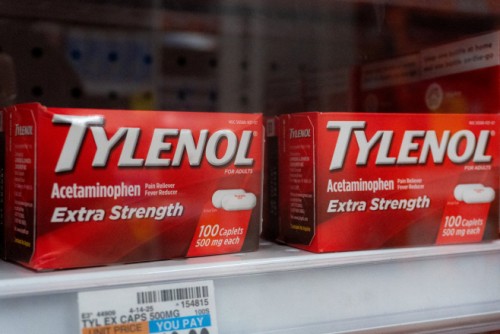 |
| Source: Yonhap |
U.S. President Donald Trump’s remarks linking Tylenol (acetaminophen) use during pregnancy to a higher risk of autism in newborns have triggered global controversy, prompting South Korea’s Ministry of Food and Drug Safety (MFDS) and medical groups to reassure expectant mothers of the drug’s safety.
Speaking at a press conference on September 22, Trump said, “Since 2000, autism rates have risen more than 400 percent,” and that the U.S. Food and Drug Administration (FDA) would notify doctors that Tylenol use during pregnancy may increase autism risks.
Acetaminophen, widely used for fever relief, is present in over 1,300 approved medicines in Korea alone. Trump’s remarks fueled concerns among pregnant women, leading the MFDS to issue a clarification. “Current approvals contain no evidence of a link between acetaminophen use during pregnancy and autism,” it said, stressing that high fever itself could harm fetal neurological development. The agency reaffirmed that acetaminophen can be taken in proper doses (up to 4,000 mg per day).
The Korean Medical Association (KMA) also rejected Trump’s claim, saying, “There is no scientifically established evidence connecting Tylenol during pregnancy to autism,” while recommending minimal, short-term use when necessary. It cautioned against alarmist interpretations by some experts that could stoke public fear.
The Korean Pharmaceutical Association added that untreated fever poses risks to fetal development and reiterated that acetaminophen remains one of the safest available drugs.
The controversy stems mainly from observational studies suggesting higher autism or ADHD incidence among children of mothers who used acetaminophen while pregnant. Experts emphasize, however, that such studies cannot prove causality. A recent review of dozens of studies concluded that while some correlations exist, the causal link remains unproven. Similar findings were reported by researchers at Mount Sinai in the U.S.
International health authorities, including the World Health Organization (WHO), the European Medicines Agency (EMA), and the American College of Obstetricians and Gynecologists, echoed that there is no reliable scientific evidence to back Trump’s assertion. Tylenol manufacturer Kenvue also strongly dismissed the claim, citing decades of clinical data.
Korean pharmaceutical companies are closely monitoring developments, as heightened consumer anxiety could hit sales, reminiscent of the early pandemic slump in fever and pain relief medication. Should the FDA impose stronger label warnings, domestic products with the same ingredient would likely be affected.
The MFDS advised pregnant women to consult healthcare professionals before using acetaminophen-based medicines. It also requested data from relevant firms regarding the U.S. government’s announcement and pledged to review new evidence carefully, noting that any credible findings would be reflected in updated safety guidelines.
Most Read
-
1
-
2
-
3
-
4
-
5
-
6
-
7





















